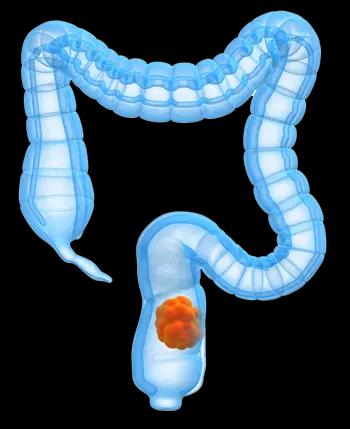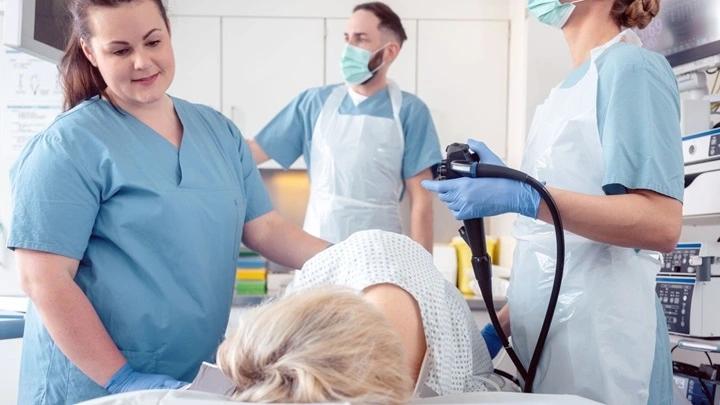
Dealing with gastrointestinal issues can be an uncomfortable and concerning experience. Many people assume that occasional bouts of gas, bloating, and changes in bowel habits are simply part of everyday life. However, these symptoms could be indicative of a more serious underlying condition – colorectal cancer.
In this guide, we’ll explore the surprising connection between colorectal cancer and excessive gas and the other early warning signs you shouldn’t ignore. By understanding the potential red flags, you can proactively safeguard your health and catch this disease in its earliest, most treatable stages.
Understanding colorectal cancer
Colorectal cancer, also known as colon cancer or rectal cancer, is a type of cancer that starts in the large intestine. It typically begins as abnormal growths called polyps that form on the inner lining of the colon or rectum. Over time, these colon polyps can develop into cancerous tumours that can spread to other parts of the body if left untreated.
Colorectal cancer is the second leading cause of cancer-related deaths in the United States, affecting both men and women equally. While it’s often thought of as an “older person’s disease,” the incidence of colorectal cancer in younger adults has been steadily rising in recent years. The American Cancer Society now recommends that average-risk individuals begin regular colorectal cancer screening at age 45, rather than the previous recommendation of 50.
The link between colorectal cancer and gas
One of the early warning signs of colorectal cancer that often goes overlooked is excessive gas. A tumour in the colon or rectum can cause a physical obstruction that disrupts the normal flow of gas and waste through the digestive system. This can lead to a range of unpleasant gastrointestinal symptoms, including:
Increased flatulence
As the tumour grows, it can create a partial blockage in the intestines, causing gas to become trapped and leading to more frequent passing of wind. Patients may notice a significant increase in the amount and frequency of their flatulence.
Bloating and abdominal pain
The trapped gas can also cause abdominal cramps, bloating and a sensation of fullness or pressure. This can be particularly noticeable after meals.
Changes in bowel habits
In addition to excessive gas, colorectal cancer can also cause changes in bowel habits, such as constipation, diarrhoea, or alternating between the two. Stools may also appear narrower or ribbon-like in shape.
Rectal bleeding
Small amounts of bright red blood in the stool or on the toilet paper caused by haemorrhoids can be an early sign of colorectal cancer, as the tumour may cause bleeding from the rectum.
It’s important to note that while gas and other gastrointestinal symptoms can be a potential indicator of colorectal cancer, they can also be caused by a variety of other conditions, such as irritable bowel syndrome (IBS), Crohn’s disease, or even something as simple as dietary changes. If you’re experiencing persistent or worsening gas, bloating, or changes in bowel habits, it’s crucial to consult with your healthcare provider for a proper evaluation and diagnosis.
Risk factors for colorectal cancer
Several factors can increase an individual’s risk of developing colorectal cancer, including:
Age
The risk of colorectal cancer rises significantly after age 45, with the majority of cases occurring in individuals over the age of 50.
Family history
Individuals with a close relative (parent, sibling, or child) who has had colorectal cancer have a higher risk of developing the disease themselves.
Inflammatory bowel diseases
Conditions like Crohn’s disease and ulcerative colitis can increase the risk of colorectal cancer due to the chronic inflammation in the digestive tract.
Lifestyle factors
A diet high in red meat, processed meats, and low in fibre, as well as a sedentary lifestyle and obesity, can all contribute to an increased risk of colorectal cancer.
Genetic factors
Certain inherited genetic mutations, such as those associated with familial adenomatous polyposis (FAP) and Lynch syndrome, can predispose individuals to colorectal cancer.
Understanding your risk factors is important in determining the appropriate screening and prevention strategies. Regular check-ups with your healthcare provider can help identify any potential warning signs and ensure timely intervention.
Screening and early detection
Early detection is key when it comes to successfully treating colorectal cancer. The American Cancer Society recommends that individuals at average risk begin regular colorectal cancer screening at age 45, with several options available:
Colonoscopy
This is considered the gold standard for colorectal cancer screening, as it allows the healthcare provider to visually inspect the entire colon and rectum for any abnormalities, such as polyps or tumours. Colonoscopies are typically recommended every 10 years.
Stool-based tests
These non-invasive tests, such as the faecal immunochemical test (FIT) or the stool DNA test (Cologuard), can detect the presence of blood or abnormal DNA in the stool, which may be an indicator of colorectal cancer or precancerous polyps. These tests are typically recommended annually.
Flexible sigmoidoscopy
This procedure is similar to a colonoscopy, but it only examines the lower part of the colon. It’s often recommended every 5 years, along with a FIT test every year.
If any of these screening tests indicate the presence of polyps or potential cancer, your healthcare provider will likely recommend a follow-up colonoscopy for a more comprehensive evaluation and potential removal of the abnormal growths.
It’s important to note that even if you’re not experiencing any symptoms, such as excessive gas or changes in bowel habits, regular colorectal cancer screening is still crucial. Many individuals with early-stage colorectal cancer don’t exhibit any noticeable symptoms, so relying solely on the presence of gas or other gastrointestinal issues can lead to a delayed diagnosis and a poorer prognosis.
Diagnosing colorectal cancer
If your healthcare provider suspects colorectal cancer based on your symptoms, medical history, and screening results, they will likely recommend additional diagnostic tests to confirm the diagnosis and determine the stage of the disease. These may include:
Colonoscopy
As mentioned earlier, a colonoscopy allows the healthcare provider to visually inspect the entire colon and rectum for any abnormalities, such as polyps or tumours. During the procedure, they may also take a biopsy of any suspicious growths for further analysis.
Imaging tests
Imaging tests, such as CT scans, MRI scans, or PET scans, can provide detailed images of the colon, rectum, and surrounding organs to help determine the size, location, and extent of any cancerous growth.
Blood tests
Blood tests, such as the carcinoembryonic antigen (CEA) test, can help detect the presence of certain proteins that may be elevated in individuals with colorectal cancer.
Genetic testing
In some cases, genetic testing may be recommended to identify any inherited genetic mutations that may be contributing to the development of colorectal cancer.
Once the diagnosis is confirmed, your healthcare provider will work with you to develop a personalised treatment plan based on the stage and location of the cancer, as well as your overall health and preferences.
Treatment options
The treatment approach for colorectal cancer will depend on the stage of the disease, the location of the tumour, and the overall health of the patient. Common treatment options include:
Surgery
For early-stage colorectal cancer, surgery may be the primary treatment, to remove the cancerous tumour and any affected lymph nodes. This may involve partial or complete removal of the colon or rectum, depending on the location and size of the tumour.
Chemotherapy
Chemotherapy, which involves the use of anti-cancer drugs, may be used in combination with surgery or as a standalone treatment for more advanced or metastatic colorectal cancer. Chemotherapy can help shrink the tumour, kill any remaining cancer cells, and prevent the spread of the disease.
Radiation therapy
Radiation therapy, which uses high-energy particles or waves to destroy cancer cells, may be used in conjunction with surgery or chemotherapy, particularly for rectal cancer.
Targeted therapy
Newer targeted therapies, such as monoclonal antibodies or small-molecule inhibitors, can specifically target certain genetic mutations or proteins that are driving the cancer’s growth, often with fewer side effects than traditional chemotherapy.
Immunotherapy
Immunotherapy, which harnesses the body’s immune system to fight cancer, is an emerging treatment option for some individuals with colorectal cancer, particularly those with certain genetic mutations or advanced diseases.
The specific treatment plan will be tailored to the individual patient, taking into account the stage of the cancer, the patient’s overall health, and any underlying medical conditions. Regular follow-up care and monitoring are also crucial to ensure the best possible outcome and to detect any recurrence of the disease.
Prevention
While there is no surefire way to completely prevent colorectal cancer, there are several lifestyle and dietary changes that can help reduce your risk:
Maintain a healthy diet
Eating a diet rich in fruits, vegetables, and whole grains, while limiting red and processed meats, can help lower your risk of colorectal cancer. A high-fibre diet may also help reduce the risk by promoting regular bowel movements and reducing the time that potential carcinogens spend in the colon.
Stay active
Regular physical activity has been shown to reduce the risk of colorectal cancer. Aim for at least 150 minutes of moderate-intensity exercise or 75 minutes of vigorous-intensity exercise per week.
Maintain a healthy weight
Obesity is a known risk factor for colorectal cancer, so maintaining a healthy body weight through a balanced diet and regular exercise can help lower your risk.
Quit smoking and limit alcohol consumption
Smoking and heavy alcohol use have been linked to an increased risk of colorectal cancer. Quitting smoking and limiting alcohol intake can help reduce your risk.
Get screened regularly
As mentioned earlier, regular colorectal cancer screening is crucial for early detection and prevention. Follow the recommended screening guidelines based on your age and risk factors.
By incorporating these preventive measures into your lifestyle, you can take an active role in reducing your risk of developing colorectal cancer and safeguarding your long-term health.
Conclusion
Colorectal cancer is a serious and potentially life-threatening disease, but it is also highly treatable when detected early. The presence of excessive gas, bloating, and changes in bowel habits can be an early warning sign of this condition, and it’s important not to dismiss these symptoms.
By understanding the connection between colorectal cancer and gas, as well as the other risk factors and early detection strategies, you can take proactive steps to safeguard your health and ensure that any potential issues are addressed promptly. Remember, regular screening and open communication with your healthcare provider are key to catching colorectal cancer in its earliest, most treatable stages.
Sources
- Early Symptoms of Colorectal Cancer – Colon Cancer Foundation
- Colorectal Cancer Symptoms – When to call a doctor – Fight CRC
Medical Disclaimer
NowPatient has taken all reasonable steps to ensure that all material is factually accurate, complete, and current. However, the knowledge and experience of a qualified healthcare professional should always be sought after instead of using the information on this page. Before taking any drug, you should always speak to your doctor or another qualified healthcare provider.
The information provided here about medications is subject to change and is not meant to include all uses, precautions, warnings, directions, drug interactions, allergic reactions, or negative effects. The absence of warnings or other information for a particular medication does not imply that the medication or medication combination is appropriate for all patients or for all possible purposes.









